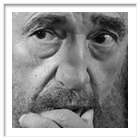| LATEST JOURNALS |
| 01-August-2006 Mel 29-July-2006 Devoured 28-July-2006 New Mid East 26-July-2006 Benefit Iran 20-July-2006 Interruption 17-July-2006 PEACE 11-July-2006 Under Bush 08-July-2006 Chaos |
![]()
![]() n a short while change will occur in Cuba. The temporary stepping-down from power by Fidel, after four decades of authoritarian rule, will lead beyond his half-brother, Raul, to the inevitable transition to
n a short while change will occur in Cuba. The temporary stepping-down from power by Fidel, after four decades of authoritarian rule, will lead beyond his half-brother, Raul, to the inevitable transition to  a post-Castro Cuba. The man is a mere mortal after all. The arrangements announced last Monday include a more significant role for younger Communist leaders who have been more agreeable to a market-oriented approach to economic management than the dogmatic Castro approach.
a post-Castro Cuba. The man is a mere mortal after all. The arrangements announced last Monday include a more significant role for younger Communist leaders who have been more agreeable to a market-oriented approach to economic management than the dogmatic Castro approach.
![]() It's not too early or soon for the United States to encourage democratic reform and for
It's not too early or soon for the United States to encourage democratic reform and for  the US to reconsider its economic embargo. It has never, in four decades, achieved its objective. Maybe we should look to the more enlightened approach to doing business with that island nation, that we have taken with Vietnam.
the US to reconsider its economic embargo. It has never, in four decades, achieved its objective. Maybe we should look to the more enlightened approach to doing business with that island nation, that we have taken with Vietnam.
![]() With the current transitionary climate there will be an enormous temptation among some of the ex-patriot Miami-based exile community to get involved and attempt to bring about immediate change. Destabilizing Cuba could have a broader impact negatively affecting a large section of
With the current transitionary climate there will be an enormous temptation among some of the ex-patriot Miami-based exile community to get involved and attempt to bring about immediate change. Destabilizing Cuba could have a broader impact negatively affecting a large section of the Caribbean. The best way to bring about healthy democratic reform will likely come with trade, people contacts and investments.
the Caribbean. The best way to bring about healthy democratic reform will likely come with trade, people contacts and investments.
![]() Simply stated, Cuba's political system is anything but democratic and built around their 80 year-old, currently hospitalized Fidel and his 75-year-old brother, Raul.
Simply stated, Cuba's political system is anything but democratic and built around their 80 year-old, currently hospitalized Fidel and his 75-year-old brother, Raul.
![]() This could be a most exciting period of change and we must be prepared, with the European Union, to encourage democratic reform. It will be a better place with life after Castro.
This could be a most exciting period of change and we must be prepared, with the European Union, to encourage democratic reform. It will be a better place with life after Castro.
Michael Jackson Talk Radio
Official site of 2003 Radio Hall of Fame inductee,
7 time Emmy Award winning, 6 time Golden Mike Award winning, Talk Radio Host.
Listen to interviews with Michael Jackson on KNX1070 AM
on Iraq, the Bush administration,
Corporate Criminals, the Economy, and the up coming 2004 election.
visitors since December 11, 2002 Copyright © Michael Jackson 2006 all rights reserved.
http://www.michaeljacksontalkradio.com
Site Design, Hosting and Animation
Illuminary Arts
